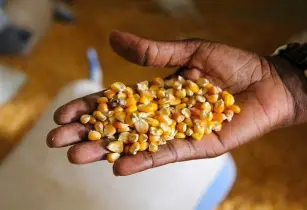The UN Food and Agriculture Organisation (FAO) is distributing seeds and fertiliser for more than one million people in north-eastern Nigeria for the planting season that begins this month as part of the efforts to restore livelihoods and combat critical levels of food insecurity and malnutrition in areas affected by Boko Haram violence
The emergency distributions come after Germany's recent contribution of $US4.5mn to alleviate food insecurity in Adamawa, Borno and Yobe states – the largest contribution FAO has received so far for the Nigeria operation. The funds will support FAO's work to further improve agricultural production and safeguard the livestock assets of vulnerable people affected by the violence including displaced people, refugees and host communities.
As part of the initiative, the FAO will provide around 2,000 tonnes of cereal, pulse and vegetable seeds and 3,500 tonnes of fertilisers to vulnerable farmers in 46 Local Government Areas, reaching 1.1mn people. Those taking part have access to land, so sufficient agricultural support is critical to enable them to benefit from the coming rainy season.
"Eighty per cent of the people in the area are farmers, and need support to return back to their farms," said Alhaji Maina Gana, chairman of the Fune Local Government Area in Yobe State.
The World Food Programme provides food rations to the beneficiaries of FAO's kit to protect seeds from direct consumption. This ensures immediate hunger needs are addressed while also enabling a future harvest. FAO is also working with the Government and national and international non-government organisations.
The governments of Belgium, France, Germany, Norway, Sweden, Switzerland and the United States of America as well as the European Commission (ECHO) and the UN Central Emergency Response Fund (CERF) have contributed to this critical planting season intervention.





